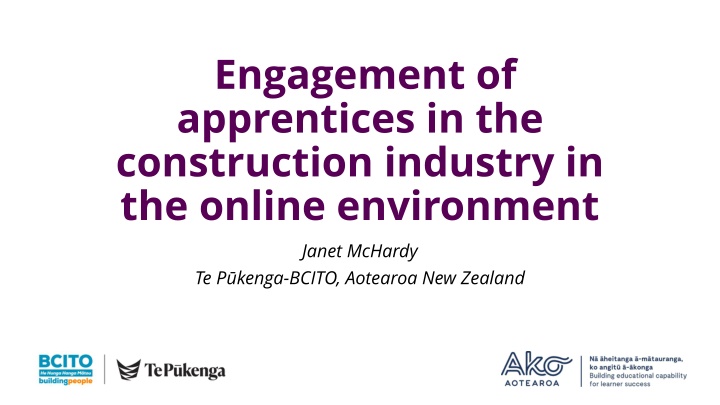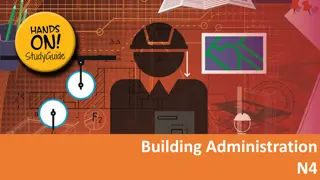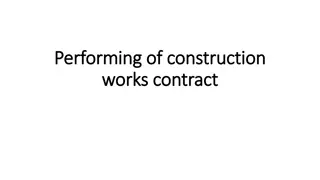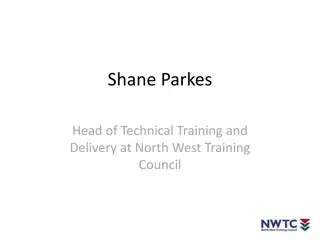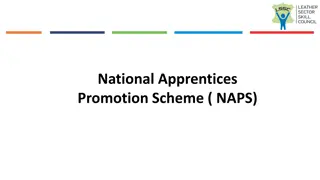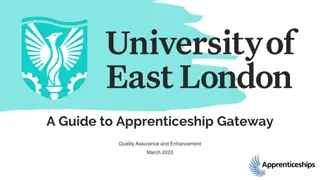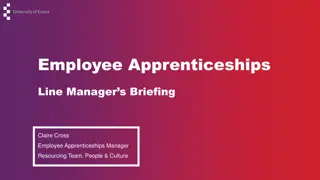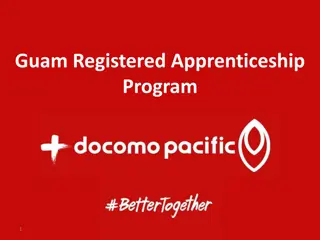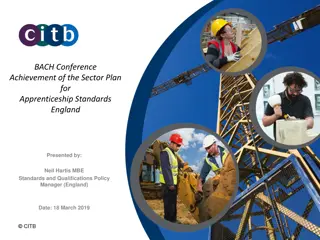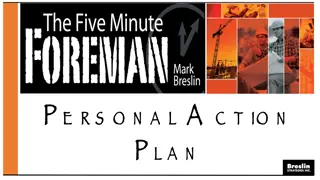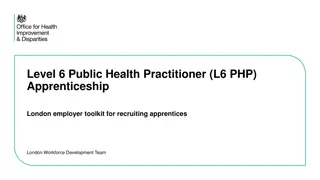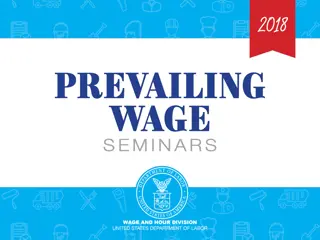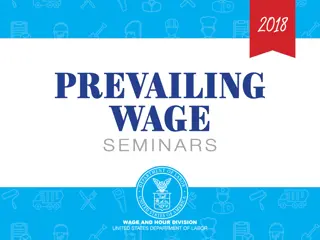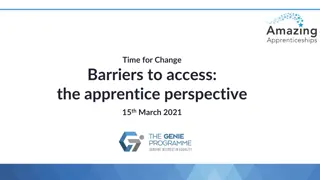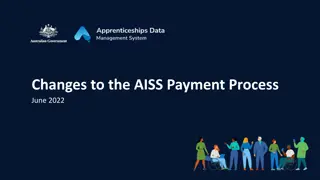Engagement of Apprentices in the Online Construction Environment
Recent national study reveals digital skills gap in adult population, highlighting shifts to technology-enabled learning in construction training. Te Pūkenga-BCITO introduces MyBCITO platform for work-based training. Emphasis on digital skills and literacy as essential components. Exploration of online engagement versus learning, addressing challenges faced by apprentices. Analysis of enabling factors and barriers for effective online experiences, with a focus on reading skills in the digital age.
Download Presentation

Please find below an Image/Link to download the presentation.
The content on the website is provided AS IS for your information and personal use only. It may not be sold, licensed, or shared on other websites without obtaining consent from the author.If you encounter any issues during the download, it is possible that the publisher has removed the file from their server.
You are allowed to download the files provided on this website for personal or commercial use, subject to the condition that they are used lawfully. All files are the property of their respective owners.
The content on the website is provided AS IS for your information and personal use only. It may not be sold, licensed, or shared on other websites without obtaining consent from the author.
E N D
Presentation Transcript
Engagement of apprentices in the construction industry in the online environment Janet McHardy Te P kenga-BCITO, Aotearoa New Zealand
Context Recent national study suggests 20% of adult pop. have below entry level digital skills Rapid shifts to technology-enabled learning across country Te P kenga-BCITO work-based construction related training Introduction of LMS (Canvas platform) called MyBCITO in 2021. Project funded by Ako Aotearoa The National Centre for Tertiary Teaching Excellence, Aotearoa New Zealand. (Funded through the Ako Aotearoa Research and Innovation Agenda - AARIA.) 17/02/2025 2
Digital Skills and Digital Literacy? Terms used interchangeably-digital skills underpinned by digital literacy Precise definition of digital skills yet to emerge Can be thought of as a combination of a digital mindset, knowledge, competence and attitude. 17/02/2025 3
Online engagement vs online learning? Difference in how uses of MyBCITO can be considered: Apprentices use the tool for functional activities such as uploading information, photos, communicating with the TA=online engagement (required skills are like those used for digital activities e.g., using social media or watching a YouTube clip for recreation) Apprentices can potentially learn online when they complete quizzes and read/study written resources on MyBCITO= online learning (may require a deeper set of cognitive skills). 17/02/2025 4
Familiarity, confidence, and competence are different May be the skills needed for online engagement are only some of the skills required for effective online learning Digital natives are not always equipped with adequate skills or the digital literacy in terms of understanding and using digital information, which is key to learning online. 17/02/2025 5
What might enable the online experience What might be barriers for an effective online experience 17/02/2025 6
Reading skill can be an enabler but being a less-skilled reader can act as a barrier Readers in the digital age must master skills to understand and use new digital practice Reading in digital environments requires many more self- organisational skills Without a repertoire of effective reading strategies readers may be at a disadvantage When reading in a digital world, there is an increase in the cognitive processing demands expected, including to be able to be navigate across multiple sources and continuously evaluate the quality and validity of these 17/02/2025 7
Competent readers can adapt to the purpose of each reading task- plays an underlying role in coordinating the different cognitive processes involved in reading online A hidden barrier to online reading may be that studies have shown that text from screens caused more overconfident predictions of performance than reading from paper-weaker performance and metacognitive awareness of their performance on assessments based on reading from screens compared to paper Self-identification of ability to operate in the online environment needs to be considered with caution. Learners may not be aware of what they do not know and what they cannot do. 17/02/2025 8
Key to successful uptake of, and engagement in the online environment is a positive mindset to learning Effective learners are willing to engage in learning generally and accept that constantly learning new skills, systems and content is a lifelong process-This is learner agency Learners with agency know how to learn, how to self-manage their learning, and have problem-solving skills Even if everyone could develop current digital skills requirements immediately, new technologies will inevitably emerge, bringing new demands, with competency levels acquired at any one time becoming outdated and inadequate 17/02/2025 9
Digital skills requirements continue to evolve, and this involves regularly upgrading individual digital skills and knowledge Individuals with learner agency can respond to the challenge of ongoing learning in the digital space, individuals without agency do not have the self-belief in their learning ability to thrive and benefit from supports offered Learner agency is overarching, equipping individuals with the self- belief and attitude to apply and maintain their training and skills making online engagement and learning possible. 17/02/2025 10
Online survey: 22,470 apprentices-952 responded 27 semi-structured interviews (face to face or phone) Interviewees also asked to complete an LNAAT assessment to measure literacy skill Matters included ownership and use of devices, access to data, how they used MyBCITO and their confidence with digital technology. 17/02/2025 11
I dont fully understand how to use MyBCITO (145/781 or 18.5%) I am not very good with online technology (46/781 or 6%), If I had training on how to use it when I started (112/758 or 15%), If I was better at reading and maths (63/758 or 8%), and If there was someone there to help me understand it (89/758 or 12%). 17/02/2025 12
Other respondents expressed low confidence levels, or that they were less skilled readers, when asked how confident they felt with technical skills when going online both generally and with MyBCITO. Ahh not very good I can do the basic stuff but other than that - sometimes I struggle with terms and the way sentences are laid out I can use basic apps and my skills are average I don t use the internet as well as I could-don t use google much. Sometimes I need help to find what I m looking for. Reading-I struggle with a lot of the content mainly cause I don t understand some terms and words. 17/02/2025 13
To participate and succeed online, key components must exist or be addressed: Appropriate digital skills Underpinned by suitable literacy skills Access-connectivity, affordability Training for new tools/initiatives Comments to do with low confidence and reading challenges were made by participants who scored at Step 2 in LNAAT or by the respondent who did not attempt LNAAT. Components supported by Learner Agency-self-belief and understanding of how to learn. 17/02/2025 14
Enablers for effective online engagement 17/02/2025 15
Ako Aotearoa. (2021). Digital literacy background paper. Author. Ako Aotearoa. (2022). Mapping the literacy and numeracy demands of BCITO resources (vol. 2). Author Alkema, A. (2020). Technology-enabled learning in the foundation education sector. Skills Highway publication. Wellington. New Zealand. Alkema, A. (2023). Scoping a digital skills framework for Aotearoa New Zealand. Discussion paper. Wellington. Ako Aotearoa. AlphaBeta, part of Access Partnership (commissioned by Amazon Web Services), (2022). Building Digital Skills for the Changing Workforce in Asia Pacific and Japan. Author. Auckland Online. (2023) Retrieved https://www.online.auckland.ac.nz/ 08 April, 2023. Australian Apprenticeships & Traineeships Information Service (AATis). (2022). Foundation Skills in Australian Apprenticeships. Webinar Series retrieved 01 April 2023 from https://www.youtube.com/watch?v=f4aHlxcztdU Australian Skills Quality Authority. (2023). Strategic review of online learning in the VET sector. Author. Avast. (2023). Digital literacy in 2023. Retrieved February 28, 2023 from https://www.avast.com/c-digital-literacy BNZ. (2022.). Digital skills for life in Aotearoa: 2022. Author. Retrieved March 7, 2022 from https://blog.bnz.co.nz/wp-content/uploads/2022/04/BNS0692-Digital-Skills- Report-20224.pdf Chauvel, F. (2022). Work Based learning literacy and Numeracy Initiatives Project. MITO. Creswell, J. W. (2013). Qualitative inquiry and researcher design (3rd ed.). Thousand Oaks: Sage Publications. Darko-Adjei, N. (2019). The use and effect of smartphones in students learning activities: evidence from the University of Ghana, Legon. Library Philosophy and Practice (e-journal). 2851. https://digitalcommons.unl.edu/libphilprac/2851. Dean, M., & Skujins, P. (2019). Digital Skilling Situational Analysis-Australia. GAN Australia. Department of Internal Affairs Te Tari Taiwhenua. (2019). The digital inclusion blueprint: Te mahere m te whakaurunga matihiko. Author. Retrieved April 11, 2023 from https://www.digital.govt.nz/dmsdocument/113-digital-inclusion-blueprint-te-mahere-mo-te-whakaurunga-matihiko/html Digital Inclusion Research Group. (2017). Digital New Zealanders: The Pulse of our Nation. A report to MBIE and DIA. Author. Digital Skills Organisation. (2020). Towards a new model for the development of digital skills. Author. 17/02/2025 16
Dulfer, N., Smith, C., van Holstein, E., Garner, A., Acosta Rueda, L., Rouse, L., Hamed, S., Cavanagh, K., & Ruppanner, L. (2022). Understanding Digital Inequality: An analysis of unequal connectivity in Carlton Housing Estate, Melbourne, Victoria, Australian Communications Consumer Action Network, Sydney. Durgunoglu, A. Y., Gencay, H., Canturk, M. & Kuscul, G.H. (2020). Cognitive and sociocultural dimensions of adult literacy and integrating technology in adult education. In The Wiley Handbook of Adult Literacy Edited by Dolores Perin, Teachers College, Columbia University. Pp 263-283. Furness, J., Hedges, M., & Piercy-Cameron, G. (2021). Adult literacy and numeracy intervention landscape in Aotearoa New Zealand. NZ Work Research Institute. Auckland, NZ. Gekara, V., Snell, D., Molla, A., Karanasios, S., & Thomas, A. (2019). Skilling the Australian workforce for the digital economy. Adelaide: NCVER. Govt.uk. (2019). Essential Digital Skills Framework. Available at wttps://www.gov.uk/government/publications/essential-digital-skills-framework Griffin, T., & Mihelic, M. (2019). Online delivery of VET qualifications: current use and outcomes. NCVER. Kantar Public Research Report. (2022). New Zealand s Internet Insights 2022. Author. Liu, Z. (2012.) Digital reading. Chinese Journal of Library and Information Science (English edition), 85-94. O Donoghue, T. (2007). Planning your qualitative research project. An introduction to interpretive research in education. London, New York : Routledge. OECD (2021). 21st-Century Readers: Developing Literacy Skills in a Digital World, PISA, OECD Publishing, Paris https://doi.org/10.1787/a83d84cb-en. Punch, K. F. (2009). Introduction to research methods in education. Los Angeles, London, New Delhi, Singapore, Washington DC: Sage Publications. Sabatini, J., O Reilly, T., Dreier, K. & Wang, Z. (2020). Cognitive processing challenges associated with low literacy in Adults. In The Wiley Handbook of Adult Literacy Edited by Dolores Perin, Teachers College, Columbia University (pp 17-41). Skills Highway & The Learning Wave. (2018.) Digital Skills in the Workplace. Skills Highway. Schwartzbach, K. (2022). Addressing digital literacy and other reasons for non-adoption of broadband. Rockefeller Institute of Government. Blog post. Retrieved February 28, 2023 from https://rockinst.org/blog/addressing-digital-literacy-and-other-reasons-for-non-adoption-of-broadband/ TEC. (2020). https://www.tec.govt.nz/news-and-consultations/archived-news/a-new-era-for-vocational-education/ Retrieved April 8, 2023. Wicht, A., Reder, S., & Lechner, C.M. (2021). Sources of individual differences in adults ICT skills: A large-scale empirical test of a new guiding framework.PLoS ONE 16(4): e0249574. https://doi.org/10.1371/journal.pone.0249574 17/02/2025 17
